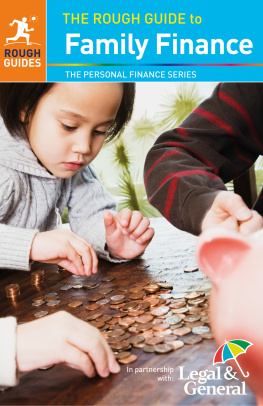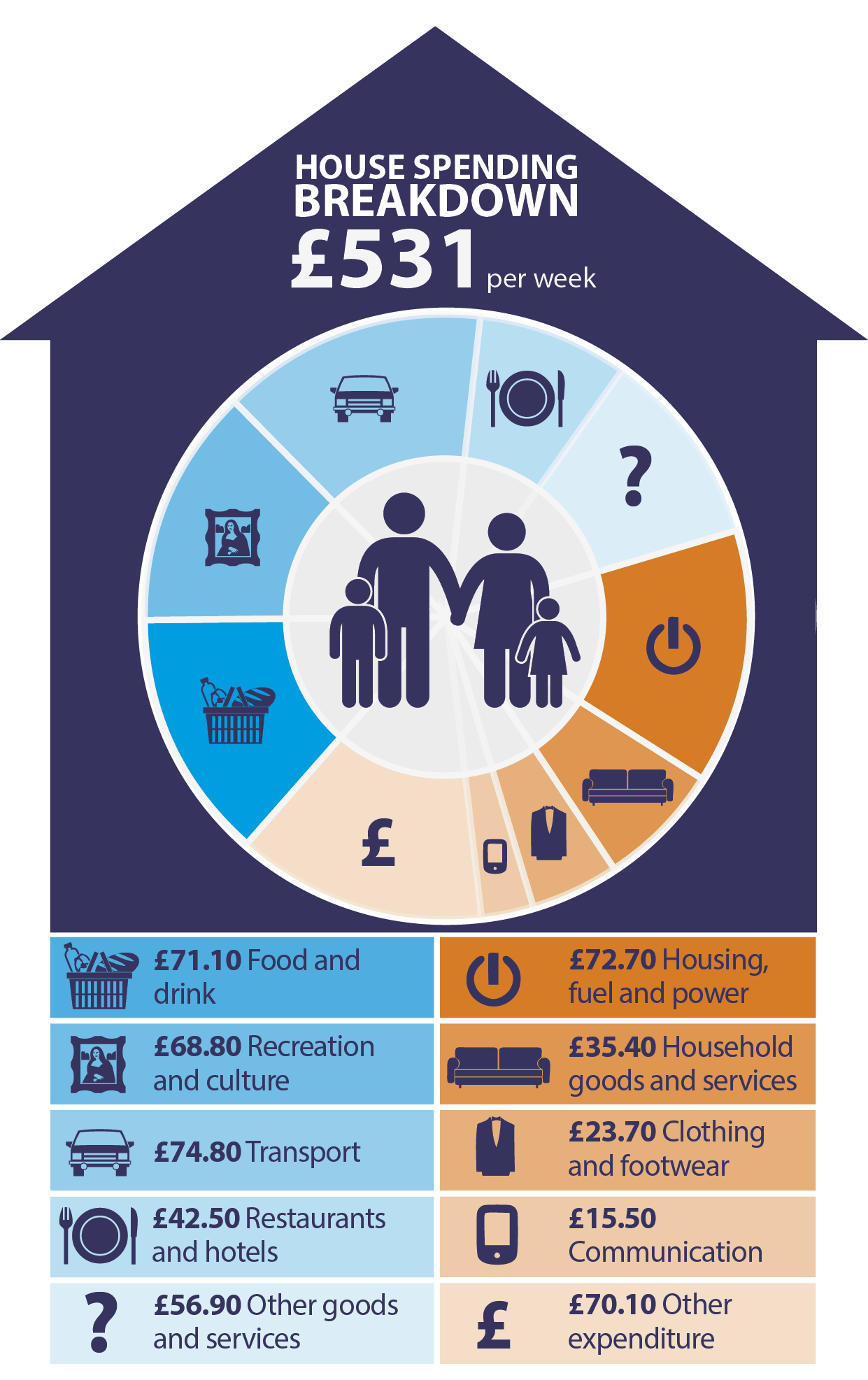The Rough Guide to
FAMILY
FINANCE
Annie Shaw

CHAPTER ONE:
Managing your family Finances
Financial security
Running your finances in tandem with other members of your family is not always as easy as it might at first seem. It would be great if you could simply work on the principle that two can live as cheaply as one, and just bank the second salary when you move in with a partner, or spend the extra income on fun things like holidays or going to the movies. Yet each partner in a relationship will make a different financial contribution or maybe none and will certainly have different spending needs. To make matters trickier, everything changes when children come along as new costs begin and priorities change.
Where to start
Helping to make your family financially secure will involve three main things:
Ensuring that you have sufficient income: Youll need to have enough money coming in to meet your familys daily needs, such as food, fuel and a roof over their heads.
Planning for the future: This will help ensure you are not left in dire straits if ever things go wrong. Your plan will probably include putting savings aside for expected and unexpected costs (such as holidays, replacing the boiler, etc.) and for your eventual retirement. Savings give you more flexibility to do things when you want to, without worrying that you wont be able to pay for essentials or that you might fall into debt. But they also help you to turn things around should the worst happen perhaps protection for the breadwinners of the family in case they are unable to provide, or cover for your possessions in the event of fire or burglary.
A budget: This enables you to meet your first two goals. A budget is simply a list of all your incomings, such as wages and benefits, and a list of all your outgoings, such as energy bills, clothing and leisure time expenses. You need to ensure that your spending never exceeds your income, and this may mean making cuts and adjusting spending in one area so that you can devote resources to another. Theres more on how to budget and manage your savings in the chapter.
TOP TIP Part of achieving financial security is not to be intimidated. Much of what you need to do is common sense, and thinking about your spending will help you to keep it under control.
Source: Office for National Statistics: Family Spending, 2015 Edition
Involving your family
Though it may be convenient for one person to be in control of the family budget and pay the bills, its a good idea if everyone is involved, including the youngest members. Encouraging a sense of financial responsibility in children helps them to be aware of the importance of budgeting as they grow up.
Make sure your children know how much domestic bills cost and encourage them to save for instance, by turning the heating down, not leaving gadgets on standby, or not leaving the water running when they clean their teeth. Learning the value of money is an important life skill, so dont be afraid to tell your children if things are tight and you cant afford something they want. After all, theres an incentive to save electricity when they realize that 50 off the bill could mean a new pair of trainers.
If your children are more computer savvy than you, get them to help you use comparison websites to find deals on gas and electricity, or to choose a mobile phone tariff.
Helping to choose savings accounts and comparing interest rates is great for childrens maths skills, and brings home to them how all those figures and tables that they learn at school have a practical use.
TOP TIP Paying the younger members of the family to do chores, either for pocket money or an addition to it, is another good idea. Dont think of it as bribery, more as teaching them about money and its relationship with work. They can start to save, too, and learn how money can grow with interest over time if invested wisely.
How banks talk about interest rates
Its not always easy to compare how much interest you are receiving on your savings, or paying on a loan, particularly if you are considering deals that last different periods of time. As well as the , the annual equivalent rate.
When taking out a loan, you may need to consider other features, such as how much the repayments cost every month or how long the loan lasts for, which may be important in your final choice. Similarly with savings, you may want to withdraw interest monthly or leave it invested to receive yet more interest. The APR or AER allow you to compare the loans or accounts on a level playing field, so you can see which is the cheapest and which the most expensive in real terms.
How you run your finances is largely a matter of personal choice. Families can pool their income for instance by having a joint account for household or other spending that involves the whole household or they can keep their finances apart in separate accounts and have an agreement about who pays for what.
Make sure that everyone pays their way to the best of their ability, particularly older children who are still living at home after finishing their education, especially if they have started working.
Benefits explained
In addition to your earnings, pension or unemployment benefits, you may qualify for one or more of the various income boosters provided by the state. These range from , paid to parents and carers of the young, to tax credits that top up a low wage, allowances for the disabled, and travel perks for the elderly.
Budgeting is useful for everyone, no matter how financially comfortable you feel. If you are on a low or fixed income, or on benefits, it is essential.
Rules about benefits can be complex, and it is not always obvious that you qualify. Find out what you are entitled to claim, whether in work or unemployed, by looking on the governments Money Advice Service website or by using a calculator, such as the ones on entitledto.co.uk or turn2us.org.uk . The Citizens Advice website is another good source of information.
Make sure you claim. Dont be put off by difficult forms or hard-to-answer questions. There are many agencies that can help you to get what you are entitled to, including Citizens Advice , AgeUK (if you are an older person), and IncomeMax . Turn2Us can also help you to find financial and other support from non-governmental grant-giving funds.
Saving for a pension
The government has made big changes to pensions, including the age at which the state pension can be claimed. See the Pensions Advisory Service website for further details. It is never too early to consider your retirement needs and, if you are able to, you should start putting as much as possible aside for your retirement as soon as you can. Bear in mind that money saved in a pension plan is tied up and cannot normally be accessed until the age of 55 at the earliest (rising to the age of 57 by 2028).
Your future financial security is just as important as your current situation, and the earlier you start saving the more potential your pension will have to grow. A good pension income will give you much more choice about how you spend your retirement. It will also lessen your dependency on anyone else, such as your children who, by the time you retire, will have spending priorities of their own.
Next page






















